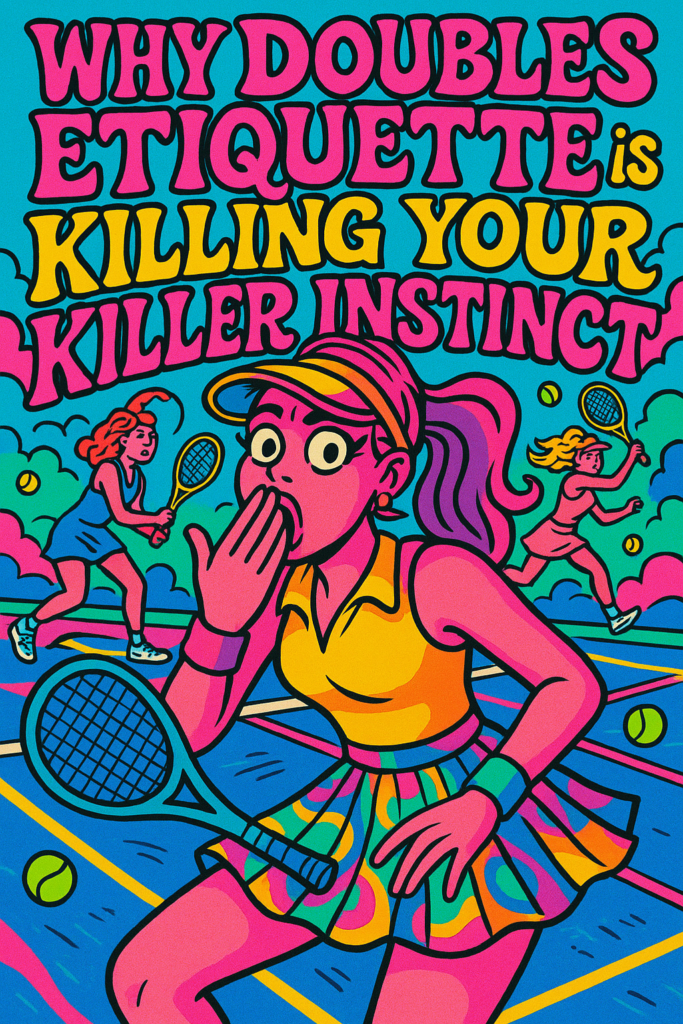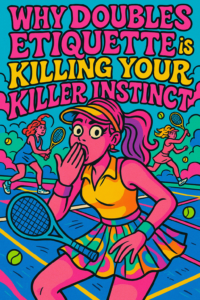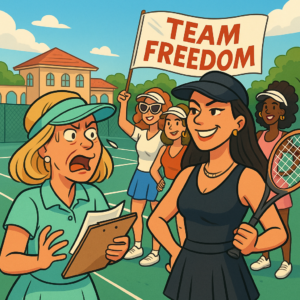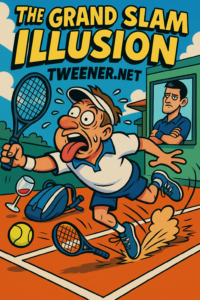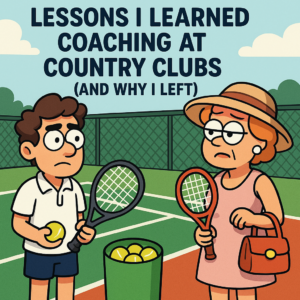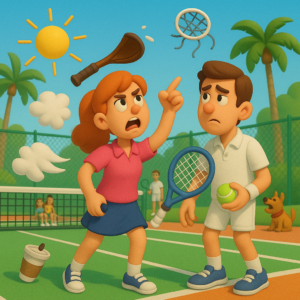Let’s rip the band-aid off: most club-level doubles players are more concerned with being liked than being lethal. You’re not playing tennis out there. You’re playing approval games wrapped in cute skirts and matching visors. And it’s murdering your competitive edge.
Sure, etiquette has its place. We don’t want a club full of rabid hyenas. But somewhere along the way, doubles became less about strategy and grit and more about who can say “Nice try!” with the most Stepford-wife smile. Here’s the cold truth: that culture is training the killer instinct right out of you.
1. The Cult of Niceness
Country club doubles is full of pleasantries. You say “Sorry” when you hit a let cord winner. You apologize for hitting a clean body serve. God forbid you actually aim at someone who crowds the net. The unspoken rule is: don’t ruffle feathers, even if that means blowing the match.
Let’s be clear: you didn’t show up to be Miss Congeniality. You came to compete. If your instinct is to pull your punch on a sitter just to avoid being labeled a “banger,” you’re playing by the wrong rules.
2. The Apology Syndrome
Why are we still apologizing for making a good play? “Oh my gosh, sorry! I didn’t mean to hit it there!” Yes. You did. And you should have. If they poach, you pass. If they crowd the net, you target the shoelaces. But doubles etiquette has twisted our thinking so badly that aggressive play feels like a faux pas.
Here’s a newsflash: winning isn’t rude. It’s the point of the game.
3. Partner Paralysis
Etiquette also trains you to tiptoe around your partner like you’re on a third date with someone emotionally unstable. You over-communicate. You hesitate to call a switch. You give up a putaway because you’re scared of “taking over.”
A real doubles team has clear roles. Alpha and beta. Hunter and helper. If you’re the stronger player and you’re not taking over, you’re doing your team a disservice. But the culture of fake fairness makes you second-guess stepping up.
4. The "Let’s Just Have Fun" Lie
Let me say this once for the people in the back: Trying to win IS fun.
We’ve been brainwashed to believe that pushing for a win is somehow toxic or ungentlemanly. So instead, people say things like, “Let’s just have a good time,” while secretly keeping score in their head and dying inside after a loss.
Stop pretending. If you wanted casual cardio, you’d be on a treadmill, not a tennis court. The court is a battlefield. You can be respectful without being a pushover.
5. The Social Shackles
There’s this ever-present fear: if you play too seriously, people won’t invite you back. Or worse, you’ll be the subject of side-eye at wine night.
So instead of playing your game, you play theirs. You dial it down, laugh off errors, underplay winners, and neuter your instincts. That’s not tennis. That’s social survival cosplay.
Here’s the irony: the players with real respect? They’re the ones who show up to compete. Win or lose, they bring fire. And they don’t need an apology after a body shot.
6. The Etiquette Paradox
Etiquette was meant to provide structure, not smother competition. The problem isn’t etiquette itself—it’s how we weaponize it to shame anyone who dares to play assertively.
A solid “Come on!” after a point? Apparently too aggressive. Fist pump after a winner? Tacky. Returning a lob with an overhead smash? Borderline criminal. You can almost feel the pearls clutching.
7. Breaking Free Without Being a Jerk
You can break this cycle without turning into the club villain. Here’s how:
Stop apologizing for good shots. You’re not a hitman. You’re a tennis player.
Be honest about your intent. You want to win. So play like it.
Talk to your partner pre-match. Lay out roles. Who covers what. Who takes the middle.
Normalize competitiveness. Compliment effort, not pity.
Respect doesn’t mean retreat. You can be tough AND respectful.
8. Unleashing the Killer Instinct
If you’ve ever left a match feeling like you had more to give but held back to be “polite,” you know exactly what’s been taken from you.
It’s time to bring that killer instinct back.
That means putting strategy before social grace. That means taking the putaway. That means calling for the alley when the poacher’s creeping. That means letting your game speak louder than your manners.
No one remembers the player who smiled after every point. They remember the one who closed the match with authority.
Final Serve: Etiquette Isn't the Enemy—Fear Is
Doubles etiquette isn’t inherently bad. It’s the fear underneath it that eats your instinct alive. Fear of being judged. Fear of being disliked. Fear of standing out.
Drop the act. Be the competitor you were meant to be. The court is no place for apologies.


